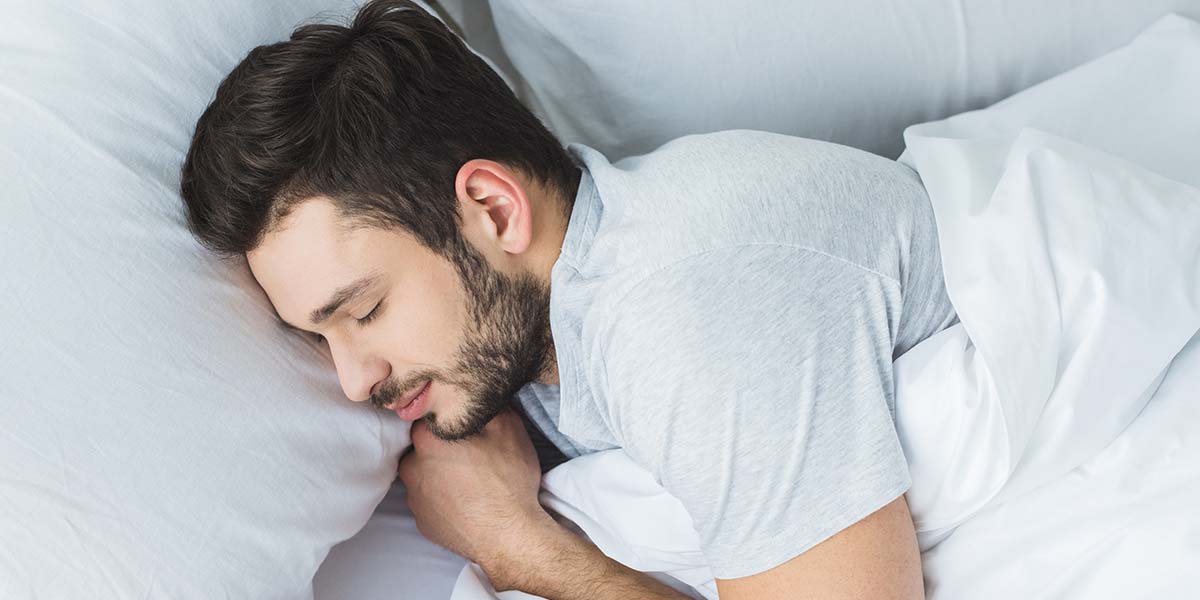If you want to maintain good skin health, there are a few fundamentals such as eating a balanced diet, managing stress levels, getting regular exercise, following a nurturing skincare routine and ensuring you get enough good quality sleep.
Sleep is critical to our mental and physical health and without enough of it, quality of life can soon suffer. It can also contribute to a variety of skin problems.

Why Sleep is Important
Whilst you sleep, the majority of the body's systems are in an anabolic state which plays a healing role in your body. Primarily it helps your systems recover and rejuvenate: immune, nervous, skeletal, and muscular systems all benefit from sleep. If you don’t get enough quality sleep, your mood, memory and reasoning are likely to be adversely affected.
There are two basic types of sleep: rapid eye movement (REM) and non-REM.
Non-REM sleep occurs first in the sleep cycle and after a transitional period is called deep sleep or slow-wave sleep. During this phase, body temperature and heart rate fall, and the brain uses significantly less energy.
REM sleep, represents a much smaller portion of total sleep time. It is the phase when we may have dreams or even nightmares. It is the period when we have desynchronized and fast brain waves, eye movements and loss of muscle tone. The sleep cycle of non-REM and REM takes an average of 90 minutes and occurs 4–6 times during a good night's sleep
Your internal body clock is responsible for controlling when you're awake and when you need sleep. This clock typically follows a 24-hour rhythm (this is referred to as our circadian rhythm). The rhythm affects our entire body - all our cells, tissue, and organs.
How the Quality of Your Sleep can Affect Your Skin
Without quality sleep, even just for one night, the appearance of your skin can be affected in several ways:
- Bags or dark circles under eyes
- Droopy eyelids
- Swollen eyes
- Pale or ‘grey’ skin
- Fine lines and wrinkles

This is because sleep helps your skin repair itself and if you don’t have a good night rest it will show on your face the next day. Whilst you sleep, blood flow increases, and your skin rebuilds its collagen and repairs cell damage such as the harm caused by UV exposure.
If you continue to suffer from poor quality sleep, it can have a more significant impact on your skin such as:
- Dry, flaky skin
- Redness
- Breakouts
The main drivers of these longer-term issues are:
Dehydration
An ongoing lack of sleep can cause a decrease in your skin’s moisture levels. Over time, when your skin's pH levels continue to fall, the imbalance can trigger your skin to produce less moisture than it needs. The imbalance can result in redness, blotches and worst case can even trigger breakouts or exacerbate a pre-existing condition. For this reason, it essential to keep your skin hydrated and moisturised.
Keeping your body hydrated is crucial to the overall functioning of your body including your brain, muscles and flushing out bad bacteria. It is also paramount for good skin health. It is also necessary to lock the moisture into your skin and you can do this with a moisturizer such as AMPERNA® Lightweight Soothing+ Emulsion. This moisturizer contains a ground-breaking probiotic formula, along with ceramides, hyaluronic acid and emollients to help nourish the skin and protect it from free radical damage. It is non-irritating, won’t clog pores and is packed full of antioxidants.
Increase in the Stress Hormone, Cortisol
Cortisol, plays a role in sleep and skin. When you’re sleep deprived, your body produces higher levels of cortisol, which increases the severity of inflammatory skin conditions such as acne. High cortisol levels also trigger the skin’s sebaceous glands to produce more sebum leading to clogged pores and breakouts.
Both the gut and the skin play a key role in defending our bodies against pathogens from the outside environment. AMPERNA® believes in holistic skin health, you may like to start reading Holistic help for Acne plus we also have Holistic Skin Coaching.

Tips for getting good quality sleep
Wind down
Create a relaxation routine that you can follow every day prior to going to bed. This might include having a shower, reading a book or pampering your skin.
Make sure you turn your computer and phone onto airplane mode at least an hour before bed. Screens promote wakefulness, so don’t get into the habit of using these devices in bed or within an hour from your sleep time.
Try to have a regular sleep pattern
Do your best to follow a regular time for rest and awake time. By following this on most days, you can train your body and your brain into a pattern.
Create a comfortable environment
Ensure you have good quality breathable linen; a comfortable pillow and mattress and keep your bedroom dark to promote uninterrupted sleep.
Sources:
https://www.nhlbi.nih.gov/health-topics/sleep-deprivation-and-deficiency
https://onlinelibrary.wiley.com/doi/10.1002/9781119476009.ch22
https://www.medicalnewstoday.com/articles/325353#more-social-and-emotional-intelligence
https://www.cosmopolitan.com/style-beauty/beauty/advice/a42908/ways-sleep-can-mess-with-your-face/


















